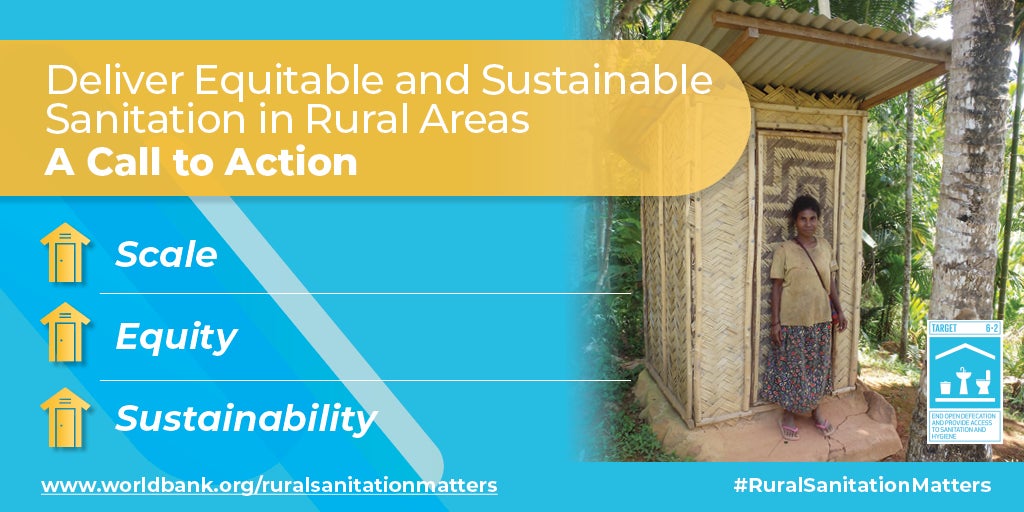 Sustainable Sanitation
Sustainable Sanitation
Why does rural sanitation matter?
Rural areas are home to 72 percent of the two billion people that lack basic sanitation services and 91 percent of the 673 million people who practice open defecation. Not enough countries are making progress on rural sanitation and without a renewed commitment to this important issue, these worrying trends will worsen, and SDG 6.2 will never be met.
There are of course key barriers to achieving equitable and sustainable sanitation in rural areas. First, many governments don’t prioritize rural sanitation in their national agendas and fail to make progressive financial commitments and the necessary policy and institutional reforms. In 2017, 90 percent of all countries reported insufficient financing needed to meet national targets for rural sanitation, and 73 percent had no properly implemented financing plan. Second, poor results from prior investments may be a compounding factor hindering rural sanitation commitments, as prior programs have not always delivered sufficient and equitable results at scale. Third, while innovations such as social mobilization and behavior change approaches have been important steps forward, the results have been mixed. A systematic review showed that most sanitation interventions only had a modest impact on increasing latrine coverage and use, averaging a 14 and 13 percent increase, respectively.
On Oct. 7, during the 2019 UNC Water & Health Conference in North Carolina, a joint Call to Action was launched by Plan International UK, SNV, UNICEF, WaterAid, the World Bank and WSSCC. This aims to galvanize renewed commitments and investments from governments, donors and development partners to deliver equitable and sustainable rural sanitation at-scale.
The conference launch kicked off a series of efforts to raise awareness and make the case for a renewed commitment to rural sanitation. In the session, we used country cases, to engage participants in reflecting on the five principles for rural sanitation programing central to the Call to Action: i) Government Leadership, ii) Stakeholder Alignment, iii) Area-wide Programming, iv) Inclusive Solutions, and v) Adaptative Implementation.
The lively panel discussion with representatives from the governments of Cambodia and Ghana, as well as USAID and Global Communities, highlighted the need for political backing of the rural sanitation agenda, a renewed focus on harder to reach areas, and the absolute necessity of strengthening complex government systems to achieve long-term results.
Although our audience at UNC was – as WASH professionals – overwhelmingly supportive of the Call to Action, group discussions revealed that realizing those principles on the ground is easier said than done! That is where the next challenge lies, and where all those in support of the Call to Action need to focus collectively so that a real difference can be made.
Together with governments and partners, we will continue to facilitate knowledge and learning initiatives on how to meet the Call to Action, starting with a webinar on November 20. The webinar will feature government leaders from Nepal - recently declared an Open Defecation Free country - and Tanzania, as well development practitioners discussing the Call to Action in more detail. We will reflect on rural sanitation interventions that can pay the most dividends. Other initiatives in support of the Call to Action include online training opportunities and face-to-face learning events with Governments, especially in Africa, to support implementation of their rural sanitation programs. To bolster support for rural sanitation, we will also collectively and constructively engage with the African Ministers’ Council on Water (AMCOW) and Sanitation and Water for All, which are important platforms that can harness political leadership for meaningful action.
With proper policy and institutional reforms, engagement, development and implementation, we can collectively increase access to quality sanitation services for rural populations – thus taking a big step forward in solving the global sanitation crisis.
RELATED
- Join the Webinar on Nov. 20, 2019
- Download the full Call to Action document
- Follow the conversation via #RuralSanitationMatters
- Learn more about our work in sanitation
- Enroll: MOOC "Rethinking Rural Sanitation"



Join the Conversation